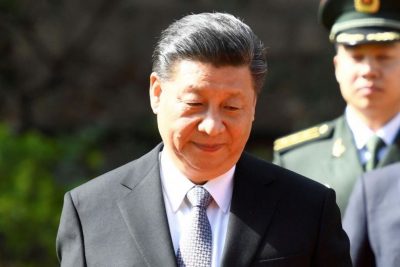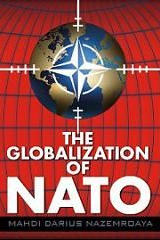Belt and Road Initiative in Full Swing in Europe
By Federico Pieraccini
Global Research, April 03, 2019
Strategic Culture Foundation
Region: Asia, Europe
Theme: Global Economy, History

45
2 3
50

The multipolar transformation that is occurring across the Eurasian continent confirms the industrial and diplomatic cooperation between China and the European continent in spite of strong opposition from the United States.
Xi Jinping‘s visit to Europe confirms what many of us have been writing about over the past few months and years, namely, the reality of an ongoing global transformation of a world dominated by the United States to a pluralistic one composed of different powers collectively shaping a multipolar world.
Europe therefore finds itself in fortuitous position, balanced as it is between its old world links to the United States on the one side and the fledgling Eurasian one being ushered in by Russia and China on the other.
Countries like Germany and France, but even the United Kingdom, have long implemented commercial policies that encourage integration between the countries of the Eurasian supercontinent. In 2015, the United Kingdom was among the first Western countries to join the Chinese Asian Infrastructure Investment Bank (AIIB), which finances projects of the Belt and Road Initiative (BRI).
The Chinese BRI mega project kicked off in 2014 with the ambitious goal of integrating trade between China and Europe by sea and by land, in the process incorporating all the countries in between. The idea, as a natural consolidation of trade, is to shorten the delivery times of goods by rail and integrate sea routes. The project covers not only ports and rail lines but also the construction of technological infrastructure to achieve global interconnectivity using the 5G technology developed by the Chinese tech giant Huawei.
Germany and France have over the years deepened their partnerships with Beijing. Paris in particular boasts historical ties with China stemming from the nuclear cooperation between China General Nuclear Power Group (CGNPC) and Électricité de France (EDF) stretching back to 1978, as well as the aerospace one between Airbus and the Chinese aviation companies that has been ongoing since 1985.

Source: SCF
Italy has in recent months approached the BRI as a result of the new government consisting of the Lega Nord and Five Star Movement (M5S). The decision to sign a memorandum of understanding between Beijing and Rome underlines how the new government wants to maintain a balanced position between Washington and Beijing in certain sectors. This is exactly the approach of Germany, which has elected to continue deepening its ties with Moscow vis-a-vis hydrocarbons and Nord Stream 2 in the face of pressure from Washington. Moreover, both Germany and Italy have confirmed that they want to rely on Huawei for the implementation and management of 5G traffic, which is fundamental to a world dominated by the internet of things.
Final Steps of the Multipolar Revolution: Containing the US in Europe
The decisions of Germany, France and Italy to continue their cooperation with Moscow and Beijing in various fields flies in the face of the narrative advanced by the American-controlled scaremongering media controlled that attempts to discourage European politicians from acting in the interests of their countries and engaging with Russia and China.
What Washington continues to misunderstand is why certain European countries are so determined to embrace the opportunities offered by the East. Italy’s recent example is quite easy to understand. The Italians hope that the BRI will provide much needed stimulus to their production industry, which has been in the doldrums in recent years. The desire for Chinese capital to give a boost to the export of Italian-produced goods is the driving force behind the proposed agreement between Beijing and Rome.
In addition to the obvious and natural desire for capital, there is also the idea of ensuring energy supply, as Germany is doing with the construction of the Nord Stream 2 with Russia. Despite strong US opposition, Berlin has favored its own national interest in energy diversification, avoiding giving in to pressure from Washington, which wanted Germany to rely on LNG supplied all the way from the US at an exorbitant price when compared to Russian-supplied gas.
There are striking divergences between Europe’s politicians, especially if we look at the relations between Macron and Salvini in Italy, or those between May and her European colleagues. Even between Merkel and Macron there seem to be notable frictions surrounding energy independence. However, in spite of these apparent divergences, the prevailing theme in the final analysis is that of wishing to escape Washington’s suffocating dominance in favor of a greater participation in the concept of a multipolar world.
No European capital – whether it be Paris, Rome, Berlin or London – intends to break the Atlantic pact with Washington. This is confirmed at every possible formal occasion. However, as Beijing becomes more and more central to questions concerning technology or the supply of liquid capital for investments or business expansion, the changes to the global order seem unstoppable.
The last obstacle remains those countries still closely linked to pro-Atlantic policies, those who find in Beijing, and above all Moscow, an excellent excuse to invite Washington’s greater intrusion into the sovereign affairs of Europe. The Baltic countries and Poland seem to offer the best inroads for US policy makers to try to influence the debate on the old continent regarding ties with the East. The artificial crises created in Ukraine, Syria and Venezuela also serve as tools to divide European leaders into opposing camps, creating the conditions to scupper European cooperation with the East.
It is no coincidence that for US strategists the two greatest dangers lie in the possibility of Moscow and Beijing, or Moscow and Berlin, cooperating and coordinating their efforts. The Berlin-Moscow-Beijing triangle, with the addition of Rome and Paris, represents a scenario for Washington that is unprecedented in terms of its challenge to US hegemony in Europe.
Wang Yiwei, Senior Research Fellow at the Center for China and Globalization, during Xi Jinping’s historic visit to Rome expressed in concrete terms the changing global order
“With the 16+1 cooperation plan between Central and Eastern European nations and China, several countries signed memoranda of understanding with China to jointly build the BIS. So far, the governments of 16 Central and Eastern European countries have signed memoranda of understanding on BIS cooperation with China. Currently, 171 cooperation agreements have been reached with 123 countries and 29 international organizations under the BIS “.
*
Note to readers: please click the share buttons below. Forward this article to your email lists. Crosspost on your blog site, internet forums. etc.
Federico Pieraccini is an independent freelance writer specialized in international affairs, conflicts, politics and strategies.
The original source of this article is Strategic Culture Foundation
Copyright © Federico Pieraccini, Strategic Culture Foundation, 2019
Comment on Global Research Articles on our Facebook page
Become a Member of Global Research
Related Articles
China-Italy Cooperation and the “Devil’s Alternative”
Mar 29, 2019
Xi’s Visit Sets Tone for China-EU Relations
Mar 29, 2019
Can Japan Join the Multipolar Revolution – Or Will US Imperialism Bring It to Heel?
Mar 24, 2019
The “American Party” within the Institutions of the European Union
Mar 21, 2019
The Trump Phenomenon as Seen in Europe
Mar 14, 2019
Trade Wars: Trump Wants US Liquefied Natural Gas (LNG) to Replace Russian Natural Gas Nord Stream Exports to the EU
Mar 13, 2019

45
2 3
50
Articles by:Federico Pieraccini
Disclaimer: The contents of this article are of sole responsibility of the author(s). The Centre for Research on Globalization will not be responsible for any inaccurate or incorrect statement in this article. The Centre of Research on Globalization grants permission to cross-post Global Research articles on community internet sites as long the source and copyright are acknowledged together with a hyperlink to the original Global Research article. For publication of Global Research articles in print or other forms including commercial internet sites, contact: publications@globalresearch.ca
www.globalresearch.ca contains copyrighted material the use of which has not always been specifically authorized by the copyright owner. We are making such material available to our readers under the provisions of "fair use" in an effort to advance a better understanding of political, economic and social issues. The material on this site is distributed without profit to those who have expressed a prior interest in receiving it for research and educational purposes. If you wish to use copyrighted material for purposes other than "fair use" you must request permission from the copyright owner.
For media inquiries: publications@globalresearch.ca
Latest News & Top Stories
Pro-Israeli Power Rolls over Washington
Selected Articles: US Puppet Guaido Stripped of Immunity
Mumia Abu-Jamal’s Next Stop: Freedom
Like Libya and Syria, Venezuela Is Not “Just About Oil”
The End of the Myth — From the Frontier to the Border Wall in the Mind of America
Jane Byrne: Chicagoans Elect First Black Female Mayor
US Drone Strikes “Outside War Zones” in Somalia, Yemen: Why Trump’s Actions Have Put Civilians at More Risk
Terms of Asylum and Distraction: Ecuador’s President Moreno’s “Assange Problem”
Don’t be Surprised by the Latest Outbreak of Xenophobic Violence in South Africa
Is Washington Preparing the Groundwork for a Maidan Scenario in Venezuela?
US Puppet Guaido Stripped of Immunity
American Idiocracy: 50 Years Later, We’re Still Stranded in the Twilight Zone
The South Dakota Legislature Has Invented a New Legal Term to Target Pipeline Protesters
A Threatening Monster
Belt and Road Initiative in Full Swing in Europe
Most PopularAll Articles

Global Research Publishers

Click Here To Order Online
NEWS
THEMES
I-BOOKS SERIES
IN-DEPTH REPORTS
GLOBAL RESEARCH VIDEOS
THE GLOBAL RESEARCH NEWS HOUR
Join Us On Facebook


youtube
rss
Global Research News
I-BOOKS SERIES
Countries Index
Most Popular
Links
Contact
Membership
Online Store
Themes
Geographic Regions
US NATO War Agenda
Global Economy
Crimes against Humanity
Militarization and WMD
Law and Justice
Police State & Civil Rights
History
9/11 & ‘War on Terrorism’
Media Disinformation
Militarization and WMD
Oil and Energy
Police State & Civil Rights
Religion
Poverty & Social Inequality
Science and Medicine
United Nations
US NATO War Agenda
Women’s Rights
GlobalResearch Center for Research on GlobalizationPrivacy PolicyCopyright © 2005-2019 GlobalResearch.ca
Aucun commentaire:
Enregistrer un commentaire